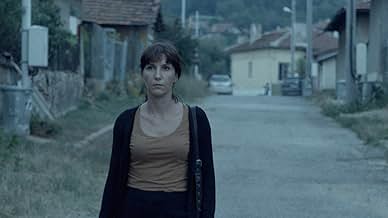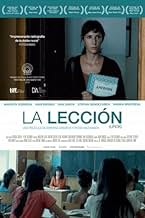In una piccola cittadina bulgara, Nadezhda, una giovane insegnante, si mette alla ricerca del ladro all'interno della sua classe per potergli dare una lezione su ciò che è giusto o sbagliato... Leggi tuttoIn una piccola cittadina bulgara, Nadezhda, una giovane insegnante, si mette alla ricerca del ladro all'interno della sua classe per potergli dare una lezione su ciò che è giusto o sbagliato. Ma quando lei stessa si troverà in debito con degli usurai, riuscirà a trovare una giust... Leggi tuttoIn una piccola cittadina bulgara, Nadezhda, una giovane insegnante, si mette alla ricerca del ladro all'interno della sua classe per potergli dare una lezione su ciò che è giusto o sbagliato. Ma quando lei stessa si troverà in debito con degli usurai, riuscirà a trovare una giusta via d'uscita?
- Regia
- Sceneggiatura
- Star
- Premi
- 27 vittorie e 13 candidature totali
- The Secretary
- (as Poly Angelova)
Recensioni in evidenza
It's a nice moral dilemma. The filmmaking is a bit weak. There are scenes missing that could elevate the drama. The obvious missing piece is the child thief. This movie is screaming for two side-by-side storytelling. The kid stealing the money could be a great second plot. Missing that, the movie still has a great idea. The ending has some poignancy but it doesn't push the tension to its limits. There are missing scenes that could really raise the intensity.
Held together by an impressive lead Nade (Margita Gosheva), The Lesson is a sturdy little micro- budget film about the financial hardships of rural Bulgaria and the daily struggle undertaken by the population to stay safely nestled in their homes and off the streets.
The Lesson begins and ends in Nade's classroom to be exact. Nade is a schoolteacher who begins her newest lesson trying to catch the culprit of an innocent child-theft between classmates; someone has stolen their classmate's wallet. Nade is intent on finding the thief and teaching them a lesson, fearing that this behaviour will transcend into the culprit's adult life and lead to more severe consequences. One of the first, if not only things we need to know about Nade is that she is an honest schoolteacher who has a deep-rooted moral and ethical compass.
Times are tough for Nade, her husband and young daughter. Barely able to afford bus fare, she arrives home one day to discover money that should have gone towards their debt has been sunk into repairs for a gearbox for a trailer her husband has repeatedly failed to sell. We learn later that this trailer doesn't just take up a seemingly permanent space on their front lawn, but acts as a metaphorical barrier between the family and the rest of the world. Tasked to make good on their debts within three days or face seeing her families worldly possessions on the auction block, Nade sets aside her better judgement and gets into business with some shady individuals to try to pay the money back, hoping to return order to her household and family life in the process.
When Nade's seemingly ordinary life couldn't seem to be getting any worse, directors Kristina Grozeva and Petar Valchanov take the very square lens of their camera, set against the rigid frames of doorways, window panes and hallways and show the reshuffled chaos entering the life of a hard-working member of a small town. Shot exceptionally well despite its lack of funding, The Lesson is a reminder that films don't need much money to look good. Adopting a quality over quantity approach, the film is a slow-burning, almost documentary-type account of the real-life tragedy that could easily plague anyone in a world of economic uncertainty.
The true star of the film is Nade, the lead played in a calm and collected manner by Margita Gosheva. Gosheva is the film's heart, soul and patience who allows for audiences to engage for as long as possible, without ever wanting to doze off. Her interpretation of Nade is a very grungy and stripped one of a very overwhelmed character; who even in the face of homelessness and threats of blackmail never sidelines her ego and pride. We come to learn that Nade's integrity is the real star of The Lesson.
What's most refreshing about the film is it's ability to write a strong female character that doesn't need to wear a cape or conquer otherworldly elements to be the glue that holds the film together. Although she never breaks down in tears, Gosheva's subtle trembling body is enough for us to physically feel the emotional toll the situation is taking on her character. Gosheva has an uncanny ability to force audiences to empathize with her during moments of complete strain and grit, although finds solace and peace while in her classroom–highlighting the stark differences in her acting abilities quite well on a moments notice.
Thankfully, in a very obvious yet equally poignant last few frames, the film allows the world of Nade's shaken life to come full circle in ways she never thought possible. The lesson at hand transforms Nade's quest for clarity into a much greater journey of understanding, self-discovery and compassion that Nade will take with her for the rest of her life. It is these last delicate and quaint commentaries that allow The Lesson to be a film that we might not want to revisit anytime soon but a lecture in film-making we won't soon forget.
Margita Gosheva stars as Nadezhda, a middle-school teacher in a small Bulgarian city. The film opens with a small theft in the classroom, and the plot circles around that issue.
Nadezhda is beset by major problems--a spendthrift husband who has no source of income, a young daughter who loves her father more than she loves her mother, and her own father who is living with a woman younger than Nadezhda. (Her father hasn't bothered to remember his granddaughter's name.)
The success of the movie depends on the actor playing Nadezhda. She is Margita Gosheva, and she is superb. (I knew she was a good actor because I saw her in another Bulgarian film--Glory.)
After watching The Lesson, I know that Gosheva is a great actor. In my opinion she is the Bulgarian equivalent of the English actor Sally Hawkins--she can do no wrong. (Anyone who can successfully portray a high-ranking civil servant in one movie and a financially strapped middle-school teacher in another movie has to be great.)
As I think back on The Lesson, I can't remember a single happy moment. So, if you're looking for a feel-good movie, this isn't it. However, if you want a powerful, intense film, seek it out and watch it.
We saw Urok on DVD, where it worked well. It has a pretty good IMDb rating of 7.2. I thought that it was much better than that, and rated it 9.
Now she is presented with some stark choices as to how to pay off her debts and so begins a very harrowing and exhausting as well as emotionally draining journey that had me increasingly gripped.
I have seen some comments that this is a slow start and I have to agree. However, you need to set the ground rules in order for the later events to have the fullest impact and I must say this really delivers. It is in Bulgarian and a bit of English, and runs to 111 minutes; it has also won a slew of awards and I have to say they are all completely deserved – recommended to lovers of European cinema and those who like their films to be a bit deeper.
Lo sapevi?
- QuizExcellent portrayals of ' Less is More ' rings true ! A very Gritty film with Superb Character development, Intense yet Quiet Acting. 10 Stars Cinematography is Outstanding, The Directing is Natural.. Congratulations to the Actors, Crew, Director Well Done on a human level.
I più visti
- How long is The Lesson?Powered by Alexa
Dettagli
Botteghino
- Lordo Stati Uniti e Canada
- 9045 USD
- Lordo in tutto il mondo
- 65.142 USD
- Tempo di esecuzione1 ora 51 minuti
- Colore
- Proporzioni
- 1.85 : 1





























